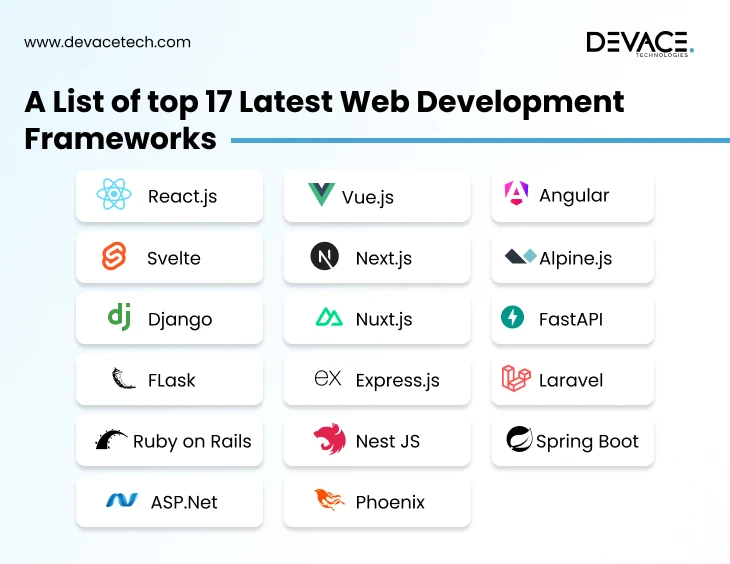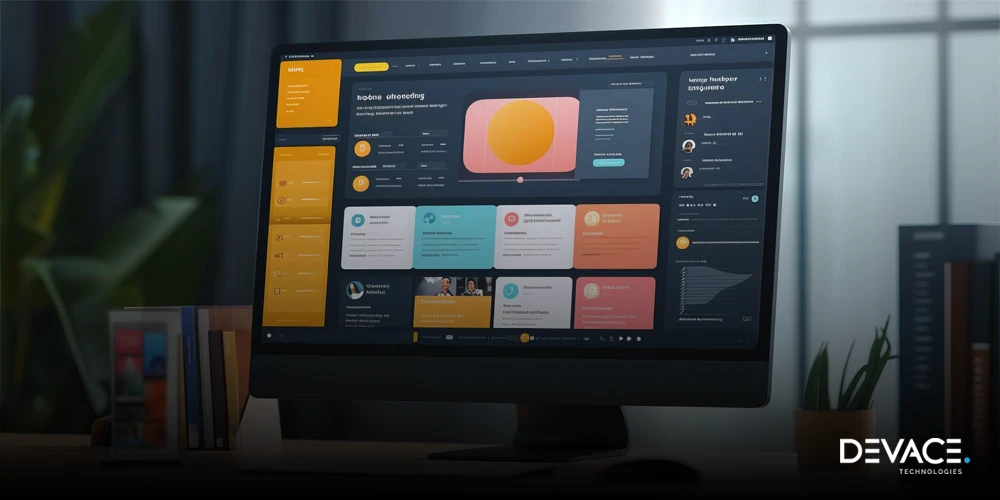For building scalable, modern, and efficient web applications, you don’t need just ideas, useful technical tools are also required. To design dynamic backend and frontend systems, web development frameworks serve as the cornerstone. They also enable developers to enhance performance, write cleaner code, and streamline workflows. Moreover, an understanding of the popular and useful web frameworks is essential, whether you are working on a small-scale project or introducing some powerful options tailored for specific project requirements.
Web Development Frameworks: An Intro
A web development framework is a collection of pre-written code, tools, and libraries that developers use to design web applications and websites. The best framework for web development assists developers in avoiding repetitive tasks such as database communication, security, routing, and session management, allowing developers to continue following best practices.
Moreover, these frameworks are broadly divided into backend and frontend categories. Backend web frameworks take care of server logic, database integration, and data processing. On the other hand, frontend frameworks handle user interaction. For your projects, you can hire remote developers to leverage all these frameworks.
Why Web Frameworks are Important?
Let’s see why the latest web development frameworks matter:
- With the help of pre-built libraries and modules, any web framework can reduce development time, ensuring an efficient process.
- Facilitate debugging, scaling up, and enhancing code readability.
- They have various built-in security features, including protection against SQL injection, CSRF protection, and input validation.
- Ensure maintainability during the whole development process by enforcing coding standards.
- All established frameworks come with extensive documentation, third-party tools, and strong community support, assisting developers in resolving issues.
Are you considering building a new web project?
Major Types of Web Development Frameworks
All the popular web development frameworks can be broadly classified into two major types: backend frameworks and frontend web frameworks for development. Let’s have a look at them:
1. Backend Web Development Frameworks
Every single back-end web development framework handles database communication, application architecture, server-side logic, and user authentication. Such frameworks are also essential for business logic, session management, and data handling.
Some examples include Flask, Django, Ruby on Rails, Laravel, and Spring Boot.
2. Frontend Web Development Frameworks
These frameworks manage the client-side of the web app development process. They handle interactive components, user interface, and overall feel and look of a website or application. With frontend web development frameworks, developers can smoothly design single-page applications and ensure they are effective in operations. You can do web development outsourcing for specific tasks to benefit from expert freelancers.
Some top front-end web frameworks include Angular, React, Next.js, Nuxt.js, Svelte, and Vue.js.
List of Web Development Frameworks
Here we have compiled the top 17 web development frameworks of 2025 for you:

1. React.js
This one is a JavaScript-based front-end library, developed by Facebook. It was primarily used for designing user interfaces. The virtual DOM and component-based architecture of React.js ensure scalability and excellent performance. Moreover, it’s useful for designing large-scale web applications and single-page web applications. Also, strong community support and a massive ecosystem, React is one of the best web frameworks in 2025 as well. You can take expert React.js developers on board to benefit from this technology.
2. Vue.js
Another JavaScript front-end framework is Vue.js, popular for its easy integration and simple architecture. This framework is ideal for new developers due to its small learning curve and two-way binding support. Although it’s a simple web framework, its modular architecture makes it powerful for handling apps. You can build scalable and interactive web applications by hiring skilled Vue.js developers.
3. Angular
Developed by Google, Angular is a comprehensive front-end framework. Based on the TypeScript programming language, it’s the best fit for enterprise-level complex applications. Moreover, this framework is packed with dynamic features such as an extensive CLI, two-way data binding, and dependency injection. For any software development company seeking scalability and performance, Angular has become the top choice, and it can be leveraged with expert Angular developers assistance from companies like Devace Technologies.
4. Svelte
It’s an innovative front-end web framework because it transfers work from the browser to the compiler. In contrast with Vue and React, Svelte compiles code at build time into efficient vanilla JavaScript. Through this approach, it becomes easier to achieve fast performance. That’s why it can be characterized as one of the fastest-expanding web development frameworks.
5. Next.js
This full-stack web framework, Next.js, is created on top of React to provide features like optimized performance, static site generation, and server-side rendering. Next.js is widely used for fast-loading web applications and SEO-friendly applications as well. Next.js is becoming one of the most popular web frameworks among developers who are focused on designing production-ready and high-performance apps.
6. Alpine.js
Alpine.js is a front-end framework, lightweight and minimal, created to introduce interactivity directly in HTML. It is mostly a perfect option for developers who are into Tailwind CSS and planning to make UIs better, and all of this is possible without having a full single-page application framework.
7. Django
It’s a high-level web framework which is built on Python. This one is among the most popular web development frameworks all because of its rapid development capabilities and simplicity. Django also has built-in security features and an ORM ensuring smooth database interactions. That’s the reason it is used in platforms with high traffic volume like Instagram.
8. Nuxt.js
Based on Vue.js, Nuxt.js backs static site generation, powerful routing, and SSR. This framework is particularly helpful for developers looking to build high-performance web applications with server-side rendering and search engine optimization capabilities.
9. FastAPI
As its name includes API, FastAPI is used to create APIs with the help of Python 3.7+. It’s an advanced-level high-performance framework, and one of the fastest frameworks for designing scalable APIs with microservices, with interactive documentation.
10. Flask
Flask is designed as a microservice framework to ensure flexibility and simplicity at the same time. That’s why it’s an ideal option for small to medium-sized web applications and microservices as well. It also gives you complete control over applications, making it a favorite choice among developers needing a lightweight tool to add extensions.
11. Express.js
This one is a minimalist and fast framework for Node.js. The best option for designing RESTful APIs and SPAs or multi-page applications. For JavaScript backend development, it’s one of the best frameworks for web development. To leverage the true potential of Express.js, you can hire expert developers from web development companies like Devace Technologies.
12. Laravel
This PHP-based backend framework follows the MVC pattern. It is a complete package with an intuitive routing mechanism, a strong templating engine- Blade, and authentication features. Laravel is also supported by a strong and large community of Laravel developers and is considered suitable for designing full-featured web applications according to your specific requirements.
13. Ruby on Rails
RoR or Ruby on Rails is a backend framework for web development. Prioritizing the productivity of developers, this is a convention over configuration framework. Moreover, it has everything required for building database-driven web applications. For early startups and MVPs, Rails is a good choice to do fast development.
14. NestJS
It’s a progressive Node.js framework built on TypeScript. NestJS was created for designing maintainable and scalable server-side web applications. Also, it backs microservice architecture, making it an extremely versatile platform.
15. Spring Boot
Another web framework is Spring Boot, based on Java and used for backend web development. Development of production-ready applications is simplified through Spring Boot. This framework also supports microservices architecture and is ideal for enterprise-level web applications. Also, it remains a top choice among developers seeking smooth backend development.
16. ASP.NET Core
Microsoft’s open-source and advanced framework, ASP.NET Core, is used for building APIs and web applications. Known for its performance, security, and speed, ASP.NET Core backs cross-platform development. Moreover, it can integrate seamlessly with Microsoft Azure and is often used in enterprise-level apps.
17. Phoenix
This backend web development framework, Phoenix, is written in Elixir and designed to have scalability and speed. The most notable thing is that this framework uses Erlang VM, famous for running fault-tolerant, distributed, and low-latency systems. Another reason behind its popularity among developers is the capability to build real-time web applications.
Wrapping Up
Many web development frameworks are emerging to tackle modern challenges of development. That’s why it is crucial to select the right one for your project. That completely depends on your requirements, team expertise to handle the framework, and the scope of the project. We have discussed the top 17 frameworks that are in trend in 2025 among developers. You can pick and choose as per your web development tasks.
Do you need help picking the right web development solution?
Frequently Asked Questions
What are web development frameworks?
Web development frameworks are structured platforms offering standard ways and reusable components to design and deploy apps. By offering multiple tools, libraries, and templates, they minimize the complexity of web development.
How to Choose a Web Development Framework for your web project?
The selection of the right framework for web development depends on various factors, including your project goals, preference for programming language, security requirements for the project, and future scalability. So, while picking up any framework, keep all the factors in mind and select the most suitable one accordingly.
What are the best Python frameworks for web development?
Some top Python-based frameworks for web development include:
- Django: For data-intensive, secure, and large-scale web applications
- FastAPI: For high-performance APIs
- Flask: For microservices and small projects



